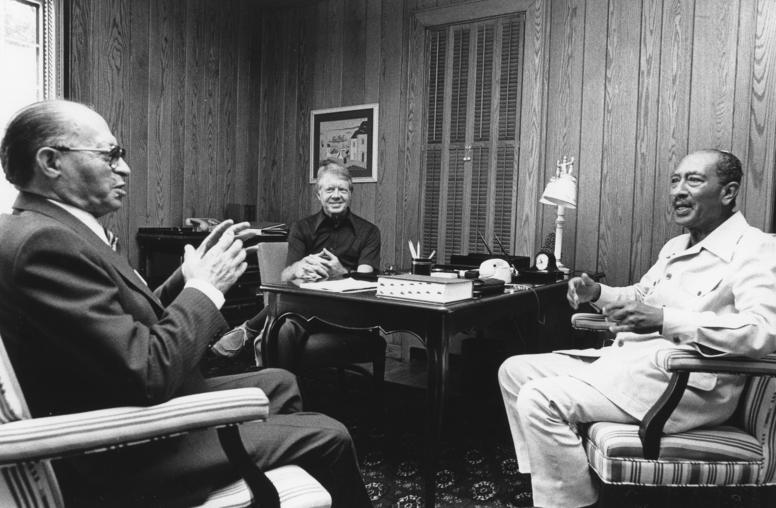USIP Conference Assesses Social Media’s Role in Conflict
The new role of social media in popular revolutions and other political change is not the inevitable force for good some commentators portray it as, but its complicated effects are promoting a wider transfer of geopolitical power from traditional nation-states to individuals and institutions, according to speakers at a conference held at the United States Institute of Peace (USIP) on September 16.
September 22, 2011
The new role of social media in popular revolutions and other political change is not the inevitable force for good some commentators portray it as, but its complicated effects are promoting a wider transfer of geopolitical power from traditional nation-states to individuals and institutions, according to speakers at a conference held at the United States Institute of Peace (USIP) on September 16.
 The rapid rise of new media and information networks, said Alec Ross, the senior adviser for innovation in the office of Secretary of State Hillary Clinton, is helping to drive a “devolution of power from large nation-states to individuals and smaller institutions.” Ross called the use of social media during the upheavals of the Arab Spring “a very powerful manifestation” of the shift. “This [power shift] is what I think is presenting the greatest challenge to governments the world over,” he said.
The rapid rise of new media and information networks, said Alec Ross, the senior adviser for innovation in the office of Secretary of State Hillary Clinton, is helping to drive a “devolution of power from large nation-states to individuals and smaller institutions.” Ross called the use of social media during the upheavals of the Arab Spring “a very powerful manifestation” of the shift. “This [power shift] is what I think is presenting the greatest challenge to governments the world over,” he said.
Ross spoke at a conference titled “Sifting Fact from Fiction: The Role of Social Media in Conflict.” Co-hosted with George Washington University (GWU), the multi-panel meeting was part of USIP’s Blogs and Bullets Initiative, an effort to encourage data collection and analysis that can yield a more accurate, fact-based understanding of how the new media are changing politics and conflict.
“We want to make sure policymakers who have responsibilities for issues of war and peace are benefitting from the new insights being generated by the research in this fast-moving field,” said Sheldon Himelfarb, director of USIP’s Center of Innovation Science, Technology and Peacebuilding. “Everyone agrees that social media played a powerful role in the events in the Middle East and North Africa of the last several months, but whether we can harness that power to proactively build a better, more peaceful region going forward remains to be seen.”
Several commentators at the conference cautioned against exuberant pronouncements that social media—widely used to organize and rally anti-government protests in Egypt, Tunisia and elsewhere in the Arab Spring movements—are the new key to toppling dictators and ushering in democracy, freedom and peace. “We should not think of social media as the finger starting the dominoes to fall,” said John Sides, a political scientist at GWU. “They are a tool, and they can be used for good and for ill.”
Added Marc Lynch, a GWU political scientist and international affairs specialist who blogs about the Middle East for ForeignPolicy.com, “This is not going to necessarily lead to democracy….Islamists use social media as well as anyone else, maybe better.” For political movements, protesters and governments alike, Lynch calls the social media “an arena within which to compete” over shaping popular attitudes and the narratives around which those vying for influence, including governments, portray their actions and aims.
Indeed, repressive governments also use social media, with some monitoring Facebook accounts to identify and then arrest activists, as Deen Freelon, a specialist in mapping and analyzing online content and behavior with American University, said. Unlike some of the other governments facing rebellion, Bahrain, according to Andy Carvin, who leads National Public Radio’s social media strategy and serves as its primary voice on Twitter and Facebook, was very effective at using social media to blunt the influence of online protesters.
Ross of the State Department said the explosion of political activism on social media was bringing on “the reaction of entrenched central authorities” intent on not losing power. He cited earlier actions by the governments of Tunisia, Egypt, Syria and Libya to shut down or hack into mobile or other networks. “It’s going to produce more and more of a body count,” he said. Ross suggested that the social media could also have the effect of further fragmenting and adding complexity to polarized societies. He called himself “pessimistic generally” about their utility in preventing conflict and finding peaceful outcomes. His suspicion, as he told the USIP gathering, is, “These tools are better at exercising dissent than forging compromise.”
That said, Clay Shirky of New York University’s Interactive Telecommunications Program, credited the use of social media with achieving a “background strengthening of the public sphere.” Arab Spring protesters, he noted, have been able to use the new technology to disseminate the place and time for protests without the involvement of mainstream media. In Egypt, social media were used to warn away people from locations where pro-regime thugs were beating up protesters, said Sultan al-Qassemi, a fellow at the Dubai School of Government.
Social media in the hands of activists also allowed ordinary people to document and disseminate evidence of government violence and other human rights abuses, speakers said. Lynch of GWU said that capability was “creating a norm against impunity.” He added, “This seems to me like a watershed….This really does fundamentally change what governments can do to their people.”
Having the new media capabilities in the hands of citizens, argued Ross, renders old-style government propaganda “largely toothless in the digital age.” As for the U.S. government, the new media capabilities will significantly change the conduct of diplomacy, he said. U.S. diplomats now need to be attentive to newly empowered publics. Ambassadors, many of whom are unused to the new forms of communication, are receiving training aimed at “trying to get them to work with networked citizenry,” Ross said, adding, “You don’t just meet with ministers and CEOs.”
“We’re trying to figure out how to engage with a new set of interlocutors,” Ross said. More broadly, the new media affords a “marvelous opportunity to connect” the governed with those doing the governing, he said.
Explore Further
- Sifting Fact from Fiction: The Role of Social Media in Conflict
USIP Event | September 16, 2011 - Social Media in the Middle East
On the Issues by Sheldon Himelfarb - Center of Innovation: Science, Technology & Peacebuilding
- Blogs & Bullets initiative



